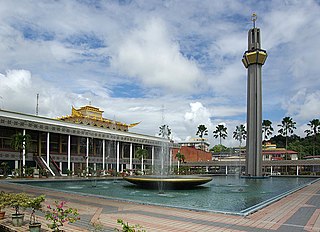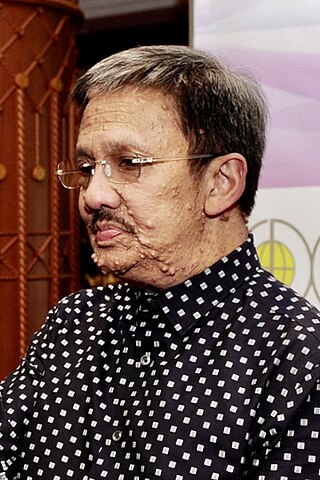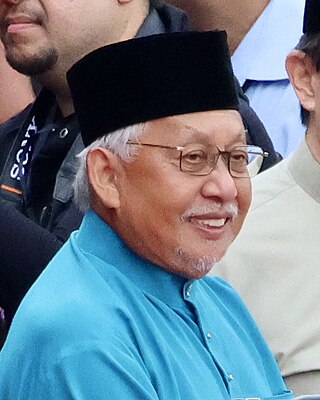Related Research Articles

The Lapau, also known as the Royal Ceremonial Hall, is a ceremonial hall in Bandar Seri Begawan, Brunei. It is where the royal ceremonies, state investiture and some state events are traditionally held. It was the place where the present Sultan of Brunei, Sultan Hassanal Bolkiah, was crowned in 1968.

The Pingat Hassanal Bolkiah Sultan is an honorary medal of Brunei. The award is subdivided into two classes: the first class Darjah Pertama and the second class Darjah Kedua.

The Ministry of Religious Affairs (MORA or MoRA; Malay: Kementerian Hal Ehwal Ugama, KHEU) is a cabinet-level ministry in the government of Brunei which is responsible for the propagation of Islam and its upholding as the state religion, as well as oversees the Islamic religious education in the country. It is currently led by a minister and a deputy minister, whereby the incumbents are Badaruddin Othman and Pengiran Mohd Tashim Pengiran Hassan respectively. The ministry is headquartered in Bandar Seri Begawan.

Abdul Malik ibni Hassanal Bolkiah is the third son of Sultan Hassanal Bolkiah by his first wife, Queen Saleha, thus making him a prince of Brunei. He is also the former Chairman of the Management Committee of the Sultan Haji Hassanal Bolkiah's Foundation from 1 March 2013 until 28 February 2017 and the Deputy Chairman 1 of the Jabatan Adat Istiadat Negara (JAIN).

Pengiran Anak Mohamed Alam OBE was a nobleman, magistrate and politician who became the fourth Speaker of the Brunei Legislative Council from 1971 until 1974 and Chief of Jabatan Adat Istiadat Negara from 1954 to 1981. He is the father of Pengiran Anak Saleha, the queen consort of Hassanal Bolkiah, the current Sultan of Brunei. He was also a maternal grandfather of Al-Muhtadee Billah, the Crown Prince.

The orders, decorations, and medals of Brunei consist of Bintang-Bintang Kebesaran and Pingat-Pingat Kehormatan. Both are awarded by the Sultan of Brunei on the basis of merit, especially on the contributions to the country. The investiture of some of the state decorations also include the conferment of titles, whereby they become part of the awardees' personal names in official correspondence or when mentioned in formal media in the country. The decorations and medals are under the responsibility of Jabatan Adat Istiadat Negara, a government department under the Prime Minister's Office, which also oversees Bruneian royal traditions and protocol.

The Most Blessed Order of Setia Negara Brunei, also translated as The Most Blessed Order of Loyalty to the State of Brunei, is an order of Brunei Darussalam. It was established on 29 November 1959 by Sultan Omar Ali Saifuddien III.

The Most Distinguished Order of Paduka Seri Laila Jasa, also translated as The Most Distinguished Order of Merit of Brunei, is an order of Brunei. It was established in February 1964 by Sultan Omar Ali Saifuddien III.
The Bruneian order of precedence is a nominal and symbolic hierarchy of important positions within the Government of Brunei. It has no legal standing but is used to dictate ceremonial protocol at events of a national nature. The order of precedence is determined by the Sultan on the recommendation of National Ceremonies Department.

The Istana Darussalam is the former residence of Omar Ali Saifuddien III and birthplace of Sultan of Brunei, Hassanal Bolkiah. The palace is located at Jalan Darussalam, Sumbiling Lama, Brunei-Muara District, Brunei. The building has become a tourist attraction and currently under the protection of the Antiquities and Treasure Trove Act of the Museums Department.

The Istana Kota Manggalela, also known as Istana Manggalela, is one of the temporary official residences of the then Sultan of Brunei, Omar Ali Saifuddien III. The palace is located at Jalan Maulana, Kuala Belait, Belait District, Brunei. The building has become a tourist attraction and historical site in the present day.

Sufri Bolkiah ibni Omar Ali Saifuddien III is a member of the royal family of Brunei. He is the third son of Omar Ali Saifuddien III, the 28th Sultan of Brunei, and Raja Isteri (Queen) Pengiran Anak Damit. He is also the President of the Brunei Darussalam National Olympic Council (BDNOC) since 2010.
The Cheteria are a group of royal dignitaries within the Sultanate of Brunei whose position ranks below the Royal Wazir but above the Manteri. Each carry specialized tasks and report directly to the Sultan of Brunei. The Cheteria hierarchy is structured around what is known as the Four Fold system which expands up to 32 folds. The title of Cheteria are only bestowed upon the Pengiran, especially to the caste of Pengiran known as the Pengiran Peranakan. The awarding of such titles are held in a ceremony called "mengangkat".

Pengiran Anak Abdul Aziz is a nobleman and formerly a police officer from Brunei who previously served as the Controller of the Royal Customs and Excise of Brunei, member of the Royal Succession Council, member of the Royal Council, and the Chief of Jabatan Adat Istiadat Negara. He was one of the concept contributors for the change in the name of the Police Force to the Royal Brunei Police Force (RBPF) as a Royal Dignitary, a State Dignitary, and a Member of Councils. Notably, he also made changes to the flag, the pattern, and the uniform color of the department's officers and staffs during his tenure as the Controller of the Royal Customs and Excise.

Dato Laila Utama Haji Mohammad Abbas Al-Sufri bin Haji Ibrahim MVO was a nobleman, civil servant and courtier from Brunei who previously served as the acting personal secretary to Sultan Omar Ali Saifuddien III. He had a career in the government service of Brunei, in which he held a number of important positions such as being a member of the Privy Council of Brunei.
The Manteri are a group of royal dignitaries within the Sultanate of Brunei whose position ranks the fourth-highest official in the country behind the Sultan. There are two main groups in the Manteri, namely the Manteri Berchiri and the Manteri Bertauliah. Each person who is given a position in the Manteri is also given a certain title. They are also referred to in official speech and correspondence with specific honorific references. The title of Manteri is given to ordinary people and is held in a ceremony, which for the awarding of the title of Pehin Manteri, it is known as "menyampiri gelaran".

Musa bin Yakub, also referred to as Pehin Dato Musa, is a Bruneian nobleman and retired military officer, who served as the commander of the Training Institute Royal Brunei Armed Forces from 1982 to 1984, and one of the few soldiers to take part in the 1960s Indonesia–Malaysia confrontation.

Pengiran Mokhtar Puteh CVO or also spelled Mokhtar Putih, was a nobleman and a civil servant from Brunei who served in several high-ranking positions which included being a member of the Privy Council and vice-president of the Brunei Darussalam National Olympic Council. He was known for his active involvement in charitable work and sport activities throughout his life.

Pengiran Anak Idris is a Bruneian nobleman and member of the royal family who became the prince consort to Princess Amal Umi Kalthum Al-Islam in 1972, the daughter of Sultan Omar Ali Saifuddien III. He is the current Chief of Jabatan Adat Istiadat Negara, a member of the Privy Council of Brunei, and assistant chairman of Adat Istiadat Council, and Yayasan Sultan Haji Hassanal Bolkiah's board of governors.

The Jabatan Adat Istiadat Negara is a government department under the Prime Minister's Office that functions to guarantee the constant maintenance of Royal Customs. It has been translated literally as the Office of State Customs, the Department of the State Customs or the State Department of Customs and Traditions, even though it does not have an English name. In order to guarantee that the practice and implementation, particularly the Istiadat Diraja, are always in accordance with the philosophy of Melayu Islam Beraja, preaching and teaching the public through lectures, briefings, and workshops on Adat Istiadat (Customs) are regularly held.
References
- ↑ Bahasa Verbal dan Bukan Verbal II (in Malay). ITBM. 2009. p. 155. ISBN 978-983-068-466-6.
- 1 2 3 4 Hajah Dayang Fatimah binti Haji Awang Chuchu (2010). "Bahasa Dalam: Continuity, Change and Preservation" (PDF). Universiti Brunei Darussalam . pp. 57–58, 61. Retrieved 16 May 2024.
- 1 2 Bahasa Dalam (PDF) (in Malay). Brunei Darussalam: Jabatan Adat Istiadat Negara. 2018. p. 1.
- ↑ Halid, Azura (5 June 2022). "Dirgahayu bahasa istana: Membentuk budaya masyarakat yang luhur". www.astroawani.com. Retrieved 25 July 2023.
- ↑ "BAHASA ISTANA". Istana Negara. Retrieved 25 July 2023.